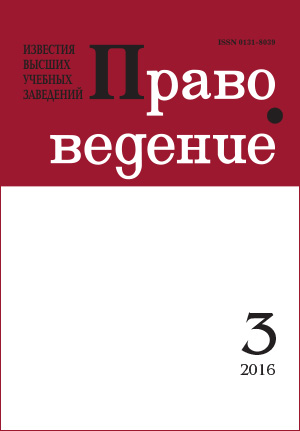M. Heidegger’s philosophy and legal thought (remarks on the review of A. V. Stovba’s article “Does the theory of law need M. Heidegger’s ideas?” Made by professor N. V. Razuvaev)
Abstract
The following article is the author’s answer towards the critical remarks of professor N. V. Razuvaev about the polemic between A. V. Polyakov and A. V. Stovba. In this paper A. V. Stovba gives his objections to the critics of the Russian legal scientist and also presents the main features of his own philosophy of law called “temporal legal ontology” which is the basis for views argued by A. V. Polyakov and A. V. Stovba. Moreover, the article includes some general reflections on the interrelation between the theory of law and the philosophy of law, subject and methodology of fundamental jurisprudence, the role of the general philosophy for the theory of law and the philosophy of law. Answering the critics of N. V. Razuvaev, A. V. Stovba resorts to various achievements of the philosophical thought: phenomenology (including responsive one), existentialism, fundamental ontology, ethics of the Other (E. Levinas) etc. The main feature of the temporal legal ontology developed by the Ukrainian legal scientist is the focus on the Legal Being, which is conceived from the horizon of the legal time. Thus, the law is conceived not as an entity — an idea, a norm, a statute etc., but rather as a being of this entity which makes it legal. Viewed from this perspective, the law is represented as a kind of a traction emerging at the moment of making a deed conforming to the law and attracting legal consequence to it. In its turn, it leads to rethinking of the key problem — normative character of law. The latter acts not as a feature of the legal entity (prescribe a certain conduct to a legal subject), but rather as a means of Law Being itself. As an origin of Law Being, A. V. Stovba suggests recourse to a special — legal — event without which the entire array of the legal entity will be dead and stagnant. Thus, the approach of the Ukrainian scientist belongs to the so-called “dynamic understanding of law” which is being developed rapidly in the contemporary legal philosophy.
Keywords:
law, temporal legal ontology, being of law, legal entity, legal being
Downloads
References
Downloads
Published
How to Cite
Issue
Section
License
Articles of "Pravovedenie" are open access distributed under the terms of the License Agreement with Saint Petersburg State University, which permits to the authors unrestricted distribution and self-archiving free of charge.




